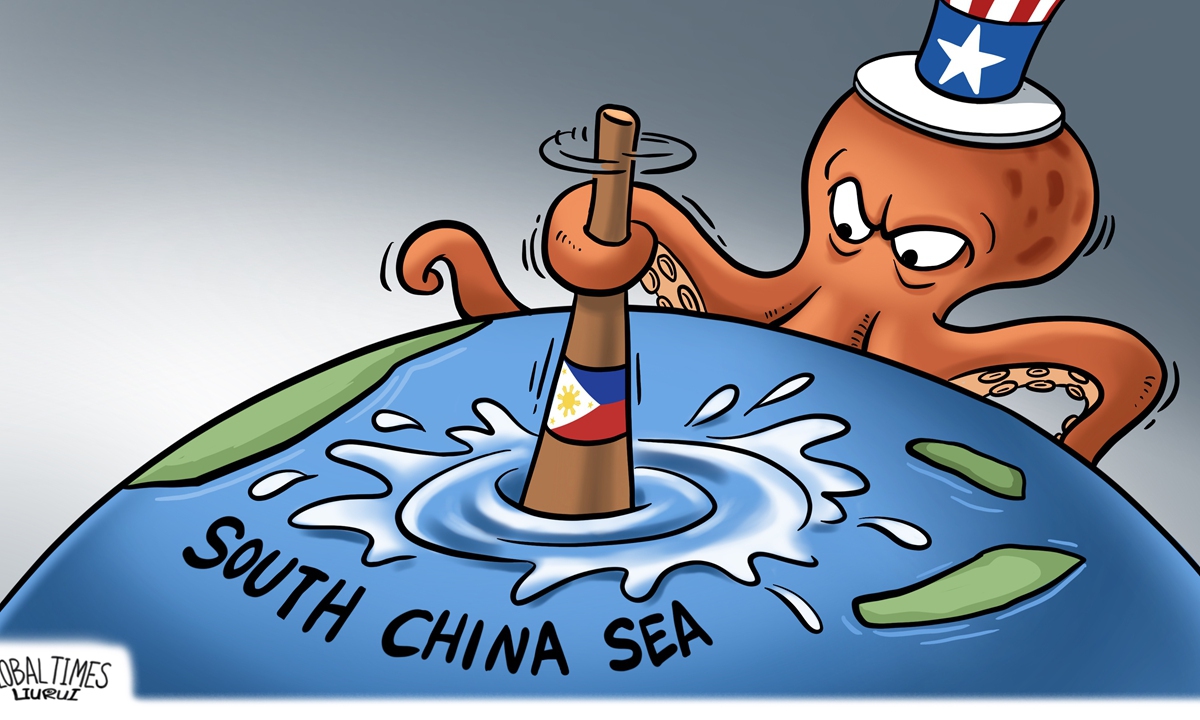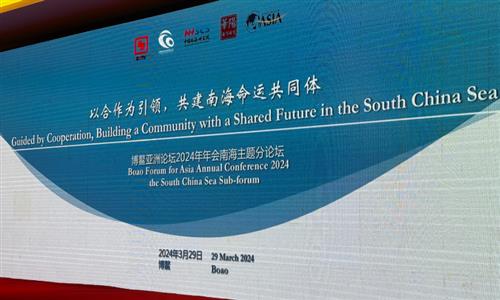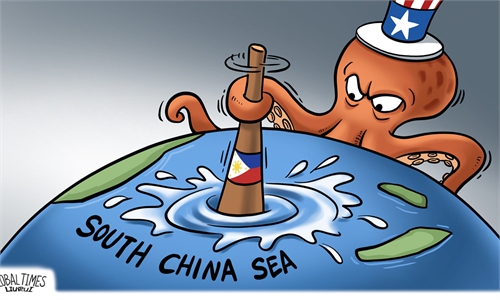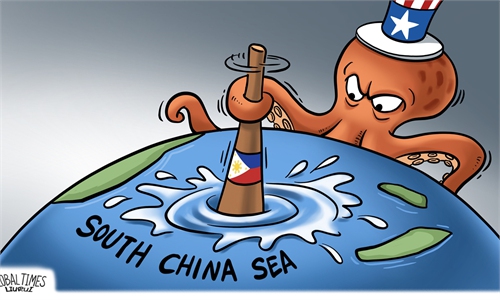Philippines provokes China with monitoring ships deployment near Xianbin Jiao
Groundless accusations may lead to standoff, exacerbate tensions in SCS

US in South China Sea Illustration:Liu Rui/GT
Amid rising tensions in the South China Sea, the Philippines' coast guard has taken a further provocative step, deploying a ship to monitor what it deems are China's "illegal activities" in waters adjacent to China's Xianbin Jiao, also known as Xianbin Reef. The Philippines also made groundless accusations on Saturday of China's construction of an "artificial island." Chinese analysts cautioned on Sunday that such provocations could spark a standoff, amplifying the strain on bilateral relations and exacerbating tensions across the entire South China Sea region.
According to a statement released by the Office of the President of Philippines on Sunday, the Philippine Coast Guard (PSG) has deployed the BRP Teresa Magbanua to monitor the supposed "illegal activities of China," which is creating "an artificial island" on what it calls the Escoda Shoal in the West Philippine Sea by destroying the coral reefs.
The statement added that two other PSG vessels were in rotational deployment in the area.
According to Reuters on Saturday, PSG spokesperson Commodore Jay Tarriela told a forum there had been "small-scale reclamation" of China's Xianbin Jiao, which Manila calls Escoda, and that China was "the most probable actor." Such claims are in total disregard of the fact that Xianbin Jiao is an integral part of China's Nansha Qundao and China has indisputable sovereignty over Nansha Qundao (also known as Nansha Islands) and the adjacent waters, analysts pointed out.
"The reefs in the Nansha Qundao within the nine-dash line are China's inherent territory. China has no intention of seizing an inch of land from other countries, but it will not cede an inch of its own territory. China's various activities on Xianbin Jiao are within our scope and sovereignty, and the Philippines has no right to interfere," a military expert, who requested not to be named, told the Global Times on Sunday.
The PSG spokesperson Tarriela also claimed the presence of Chinese vessels at the atoll 200 kilometers from the Philippine province of Palawan "coincided with the coast guard's discovery of piles of dead and crushed coral," Reuters reported.
The accusation of the so-called China's building of artificial islands and worries over the natural environment are both groundless, and they are all disinformation and are an excuse for the Philippines to justify its maritime provocations, Chen Xiangmiao, director of the World Navy Research Center at the National Institute for South China Sea Studies, told the Global Times on Sunday.
By portraying itself as a victim in the region, the Philippines is trying to convince the international community that China is the one jeopardizing the status quo. Such move calls for timely clarification with facts, Chen noted.
Xianbin Jiao is located next to Meiji Jiao (also known as Meiji Reef). Meiji Jiao is one of the more developed islands where China has undertaken construction. Adjacent to Meji Jiao is Ren'ai Jiao, which has become a focal point of conflict between China and the Philippines, the military expert noted.
"The Philippines must not mistake China's restraint for weakness," the military expert warned. "If the Philippines persists in provoking China's sovereignty, taking a one-sided approach, then all accounts, old and new, will have to be settled together." The above-quoted expert elaborated that the Philippines' recent provocations have escalated, with the core factor being support from the US. "However, such actions will not bring any benefits to the Philippines. Instead, they are likely to backfire, causing self-inflicted harm," he warned.
Chinese Vice Foreign Minister Sun Weidong told reporters on Friday after the 30th ASEAN-China Senior Officials' Consultation in Jakarta, Indonesia that the US deployment of medium-range ballistic missiles in the Philippines seriously threatens national security in the region and undermines regional peace and stability, when responding to an inquiry from the media on the US deployment.
Sun said the US action is reversing the course of history and runs counter to the common aspiration of the region for peace and development.
Sun said China firmly opposes the recurrence of Cold War-style confrontation in the region and the use of regional countries as tools of hegemony and proxies, adding that he expressed China's grave concerns during the meeting in Jakarta.
"China supports ASEAN in strengthening its strategic independence and stands ready to work with regional countries to follow the path for Asia that ensures security through extensive consultation, joint contributions and shared benefits, and firmly uphold regional peace and stability," Sun said.
Gu Xiaosong, dean of the ASEAN Research Institute of Hainan Tropical Ocean University, told the Global Times on Sunday that "the US, as a country outside the region, should contribute to maintaining peace and stability in the South China Sea. However, recently, the US has been consistently engaging in provocation and meddling, especially by supporting the Philippines' disruptive actions in the South China Sea."
The Philippines' sending coast guard ships to China's Xianbin Jiao could spark a standoff, amplifying the strain on bilateral relations and exacerbating tensions across the entire South China Sea region, Gu warned.




